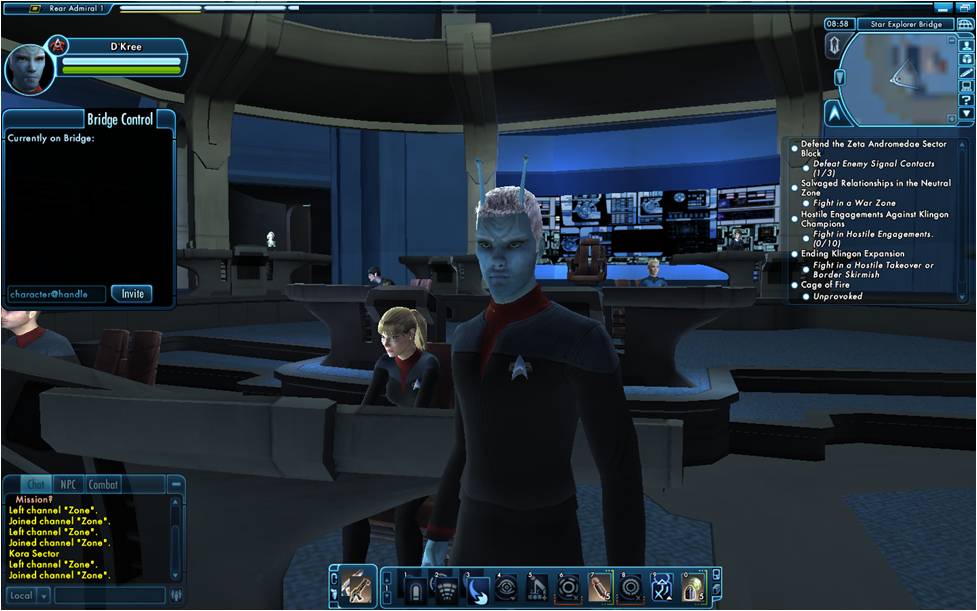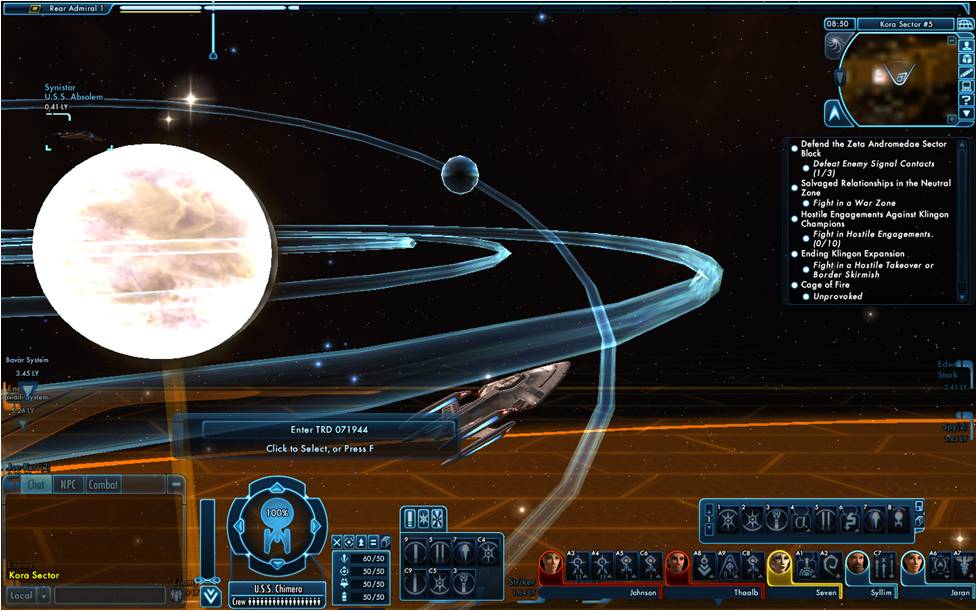MMO Trek, MMO Problems
 In downloading Star Trek Online, I intended to play a few hours and share some initial impressions about its translation of the license into a massively multiplayer experience. I’d never discovered the appeal of MMOs, despite sampling them in the past, so I was curious how a familiar license might change the genre for me. Many many hours (days?) of play later, however, I write this entry as Rear Admiral D’Kree of the advanced escort USS Chimera, nearly fully leveled up with only a handful of quests remaining. Given all the time spent to get there, I should use this space to praise STO‘s ability to immerse me in the venerable franchise.
In downloading Star Trek Online, I intended to play a few hours and share some initial impressions about its translation of the license into a massively multiplayer experience. I’d never discovered the appeal of MMOs, despite sampling them in the past, so I was curious how a familiar license might change the genre for me. Many many hours (days?) of play later, however, I write this entry as Rear Admiral D’Kree of the advanced escort USS Chimera, nearly fully leveled up with only a handful of quests remaining. Given all the time spent to get there, I should use this space to praise STO‘s ability to immerse me in the venerable franchise.
Unfortunately, I’d rather argue that the game fails both in making the Star Trek universe an inhabitable virtual space and engendering community and participation within it. In panning STO, I’m a little late to the party. Many reviewers have already declared it “bland and shallow“, “simplistic and brainless“, and “boldly going nowhere.” However, the game further exemplifies Trevor Elkington’s notion of “self-defeating co-productions,” where licensed games fail because of irreconcilable goals to please both fans of cross-media licenses and fans of a specific game genre. Frankly, the problem here is less that developer Cryptic Entertainment served two masters, and more that the game proves ill-suited to serve either.
One major appeal of the MMO is its potential to offer expansive, continuous experiences of the Trek world. Yet I can visit more Trek locales just as immediately on television than I can in STO. I can orbit Earth in game, but can’t beam down to the familiar Starfleet Academy grounds . I can traverse the galaxy, but I can’t visit our closest neighbor, Mars. Instead, the universe is represented by a small number of confined spaces–like television soundstages–and countless loading screen separate them–like elliptical video edits. Granted, traversing all that space would make for undramatic television, but in an MMO, this inability to ontologically render the universe prohibits the pleasures offered by World of Warcraft, where one can experience every step of the journey in that world. While Jonathan Gray argues that many otherwise poor licensed games offer the pleasure of newly navigating continuous spaces between recognizable television set-pieces, STO provides neither a full complement of sets nor explorable empty space between them.
License aside, STO‘s design also disincentivizes the collaborative social relations TL Taylor places at the center of MMO gameplay. In STO, “instanced” gameplay generates multiple, parallel versions of the gamespace, negating the sense of singular, shared, co-populated social space. Automatic team assignment within instances additionally prevents relationship building and shared pre-mission strategizing. Players divided into small, server-determined groups usually proceed to shoot randomly at things without speaking to one another. AI crewmembers further make cooperation unnecessary, and players rarely even acknowledge one another’s co-presence. The best and worst mission is the Crystalline Entity fight; it is perhaps the only quest that requires massive cooperation between several players, but because players are not socialized to cooperate, and usually work at cross-purposes, it became almost impossible to beat. The social logic of MMOs–and heck, Star Trek–is betrayed by my self-reliant attainment of the final rank of Rear Admiral having made only two, fleeting social connections.
Both those friends quit the game in frustration. While self-defeating co-production might explain why they quit, it doesn’t quite explain why suckers like me persevere. Despite the game’s failures, I feel my specific interests in the property and the achievement possibilities laid before me by the game proved a powerful combination; as a longtime fan, I coveted the Defiant-class starship available only to higher ranking players, and that sufficed to motivate me through mediocrity (but also to deflate my interest once finally attained). But I’m still unsatisfied with this answer, and I’d like to think there’s another critical/cultural dynamic in play beyond my particular fan/achiever personality.




I had issues with my internet service that prevented me from playing STO when it came out, but I’m ready to give it another shot. I’m guessing my experience will match up with yours, in many respects. I love Star Trek way more than I love MMOs, and I’m guessing that profile is similar to the one Cryptic was aiming for with STO. In other words, a “big” MMO environment, but without all that MMO commitment (e.g., several hours a week or day grinding away at WoW or similar). Looks like it failed to deliver on even that count. That said, my characters look pretty damn cool in their custom Starfleet uniforms…
Still, if they can sustain the property for long enough, they can make it more robust with add-ons and updates. I wonder if in-game collaboration is something better achieved in new IPs rather than established properties. Something to ponder, though by someone else; I’m not enough of a gamer or game scholar to be able to look into that.
Sorry for my slow reply–I was out of town…
You’re right that things certainly could improve with content updates, etc. And in that sense you might be better off than I after your service problems, since it would take an absolutely massive overhaul to get me to consider playing through everything again with another character. I’d also see some potential for the release of each subsequent faction after the Federation to improve in areas this first release failed. But that’s all IF the game proves sufficiently commercially viable to sustain all those updates. I read just yesterday that the subscriber base is 100,000. Now it’s certainly not fair to compare that to WoW’s 10 million subscribers after that game had years to reach that point, but I’d imagine that all the negative reviews of STO aren’t helping to build that number up.
Friend me when you get back into the game (D’Kree@derekjohnson). I’ve love to form a fleet or something.
I would just like to say that I love the title of this post, Derek. Nicely done, sir. 🙂
Thanks, Lindsay–I’m usually terrible with titles!
Hey Derek,
Interesting take on the STO adaptation. Glad my essay was helpful to you, and thanks for the shout out. I haven’t played STO, but it sounds unfortunately common in alienating Star Trek fans while not attracting MMO fans. I’ll try to take a closer look when I have a chance. In this case, it sounds like there were some insurmountable problems hardwired in their engine that played out in their design; i.e., the inability to drill down to planet level or visit Mars to me suggests difficulty in balancing the micro of planets versus the macro of the universe. The limited p2p interactions, on the other hand, are really surprising. I’d be really interested to know the thinking behind that design choice. Anyway, great read. Thanks!
Thanks, Trevor! I do admit that the game is slowly improving–they’ve been releasing new content as “seasons” in emulation of television seriality. “Season 2” introduced some new things like being able to actually beam down to planets like Vulcan (though I still need to check if that’s only when you have a mission to complete there, or if it’s a persistent locale). They’ve also started playing up diplomacy in a way that at least seems more appropriate to the license (instead of just blowing up everything that moves). But it wears thin pretty quick when you realize that its just the same old mechanics being newly awarded Diplomacy XP. Diplomacy isn’t a new way to play so much as a new metric. But it’s a start. The big problem for me is still the instancing; even with all the license-familiar spaces you can’t get to, the places you can access still aren’t really shared on a massively multiplayer scale. As you say, there’s likely something hardwired into the engine that makes that necessary, which means despite incremental improvements, a true Trek MMO might just not be feasible with the tools at hand.